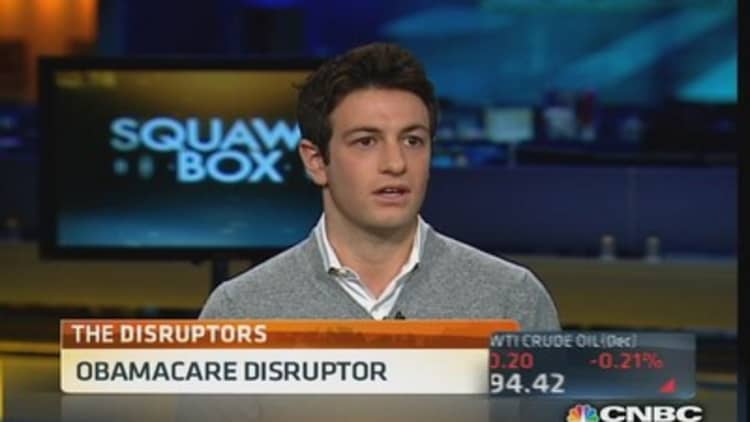When you enter Oscar Insurance's headquarters in New York's trendy Soho, you'd be forgiven for thinking you'd stumbled into a tech start-up. Young hoodie-wearing workers confer around a standing desk in the loft-like space, there's a pingpong table in the lobby and the office dog has its own Instagram account.
But make no mistake, Oscar is a health insurance company that means business. It's just not business as usual, in the age of Obamacare.
"We wanted to build a company that was like having a doctor in the family," said Kevin Nazemi, co-founder and president and a former marketing executive at Microsoft. And it appears that the approach is working, at least among participants on New York's health-care exchange.
Nazemi, and fellow co-founders Mario Schlosser, and Josh Kushner, are all young tech veterans with start-up experience. Kushner's Thrive Capital helped fund firms like Instagram. The driving force behind their insurance start-up is to use technology and data to create a more consumer-oriented health-care company.
(Read more: Hospital cuts out the middleman and sees success)
"Big data is interesting only if you can light up consumer experiences that point you to the type of doctor that you're looking for, the type of care that you're looking for," explained Nazemi, "or give you the context for what the care might cost relative to your specific plan."
To launch Oscar, they raised $45 million from venture capital firms last year, including General Catalyst; Khosla Ventures, headed by Sun Microsystems' co-founder Vinod Khosla; and Founders Fund, headed by venture capitalist Peter Thiel. They received an additional $30 million in January.

"I think that the validation there is that people see the potential in action of a company coming into an industry that has had a history of giants, that are slow moving in what they do," Nazemi said.
Insurers who have traditionally dealt with selling insurance to large employers will need to be increasingly consumer-oriented in the era of the Obamacare, according to a Deloitte Consulting report.
(Read more: WellPoint says exchange enrollment ahead of plan)
With the introduction of the Affordable Care Act insurance marketplaces, upstarts like Oscar have the ability to compete head-to-head with the established giants.
"You may be able to configure what it takes to make a health plan more efficiently and effectively than a lot of the traditional players," said Deloitte Consulting's Paul Lambdin, who specializes in health-plan exchanges.
Longer-term, Lambdin said, securing attractive provider networks, pricing contracts and managing medical costs will pose big hurdles for new Obamacare insurance upstarts like Oscar.
"They have to bring along providers, and it has to come out at a competitive price, and historically that's worked best with insurers with scale," he said.
(Read more: Cubist Pharma waging a war against superbugs)
Operating just in New York City, Oscar has managed to contract with a wide network of area doctors and hospitals. It has also contracted with mobile health provider Teledoc, which will allow members to access a doctor any time for free over a phone or computer.
The telemedicine consults may be especially appealing to a younger, more tech-savvy demographic than overall enrollment on New York's health exchange. Since launching in October, Oscar executives say their enrollment has skewed to those who are under age 55.
"Because we utilize technology and data we have ... signals of what's coming in, and we feel that the risk that we have is manageable," Nazemi said.
The upstart won't give any specific enrollment numbers until after open enrollment closes March 31, except to say that it's in the thousands. In their regulatory filings, they had anticipated signing up 7,500 customers this first year, and right now they appear to be on track to exceed that.
—By CNBC's Bertha Coombs. Follow her on Twitter @berthacoombs.


